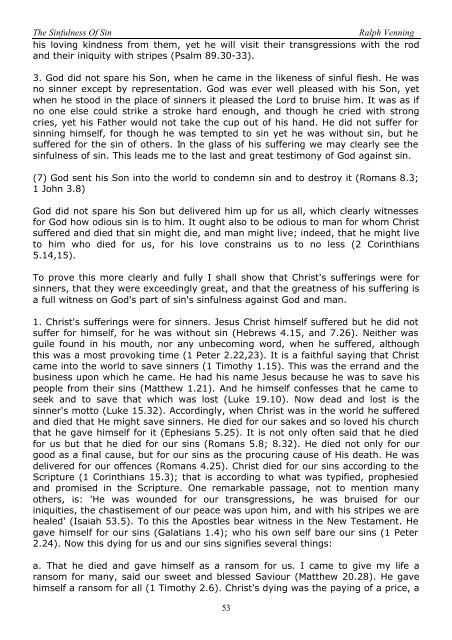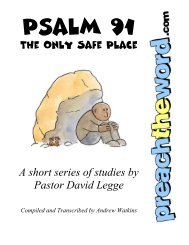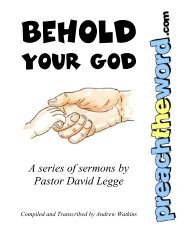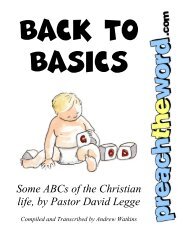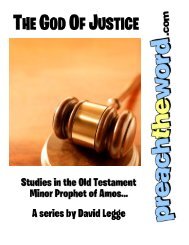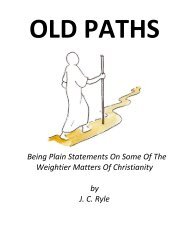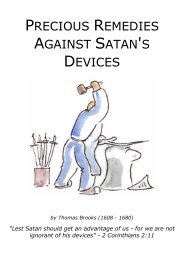The Sinfulness Of Sin - Preach The Word
The Sinfulness Of Sin - Preach The Word
The Sinfulness Of Sin - Preach The Word
Create successful ePaper yourself
Turn your PDF publications into a flip-book with our unique Google optimized e-Paper software.
<strong>The</strong> <strong><strong>Sin</strong>fulness</strong> <strong>Of</strong> <strong>Sin</strong>Ralph Venninghis loving kindness from them, yet he will visit their transgressions with the rodand their iniquity with stripes (Psalm 89.30-33).3. God did not spare his Son, when he came in the likeness of sinful flesh. He wasno sinner except by representation. God was ever well pleased with his Son, yetwhen he stood in the place of sinners it pleased the Lord to bruise him. It was as ifno one else could strike a stroke hard enough, and though he cried with strongcries, yet his Father would not take the cup out of his hand. He did not suffer forsinning himself, for though he was tempted to sin yet he was without sin, but hesuffered for the sin of others. In the glass of his suffering we may clearly see thesinfulness of sin. This leads me to the last and great testimony of God against sin.(7) God sent his Son into the world to condemn sin and to destroy it (Romans 8.3;1 John 3.8)God did not spare his Son but delivered him up for us all, which clearly witnessesfor God how odious sin is to him. It ought also to be odious to man for whom Christsuffered and died that sin might die, and man might live; indeed, that he might liveto him who died for us, for his love constrains us to no less (2 Corinthians5.14,15).To prove this more clearly and fully I shall show that Christ's sufferings were forsinners, that they were exceedingly great, and that the greatness of his suffering isa full witness on God's part of sin's sinfulness against God and man.1. Christ's sufferings were for sinners. Jesus Christ himself suffered but he did notsuffer for himself, for he was without sin (Hebrews 4.15, and 7.26). Neither wasguile found in his mouth, nor any unbecoming word, when he suffered, althoughthis was a most provoking time (1 Peter 2.22,23). It is a faithful saying that Christcame into the world to save sinners (1 Timothy 1.15). This was the errand and thebusiness upon which he came. He had his name Jesus because he was to save hispeople from their sins (Matthew 1.21). And he himself confesses that he came toseek and to save that which was lost (Luke 19.10). Now dead and lost is thesinner's motto (Luke 15.32). Accordingly, when Christ was in the world he sufferedand died that He might save sinners. He died for our sakes and so loved his churchthat he gave himself for it (Ephesians 5.25). It is not only often said that he diedfor us but that he died for our sins (Romans 5.8; 8.32). He died not only for ourgood as a final cause, but for our sins as the procuring cause of His death. He wasdelivered for our offences (Romans 4.25). Christ died for our sins according to theScripture (1 Corinthians 15.3); that is according to what was typified, prophesiedand promised in the Scripture. One remarkable passage, not to mention manyothers, is: 'He was wounded for our transgressions, he was bruised for ouriniquities, the chastisement of our peace was upon him, and with his stripes we arehealed' (Isaiah 53.5). To this the Apostles bear witness in the New Testament. Hegave himself for our sins (Galatians 1.4); who his own self bare our sins (1 Peter2.24). Now this dying for us and our sins signifies several things:a. That he died and gave himself as a ransom for us. I came to give my life aransom for many, said our sweet and blessed Saviour (Matthew 20.28). He gavehimself a ransom for all (1 Timothy 2.6). Christ's dying was the paying of a price, a53


